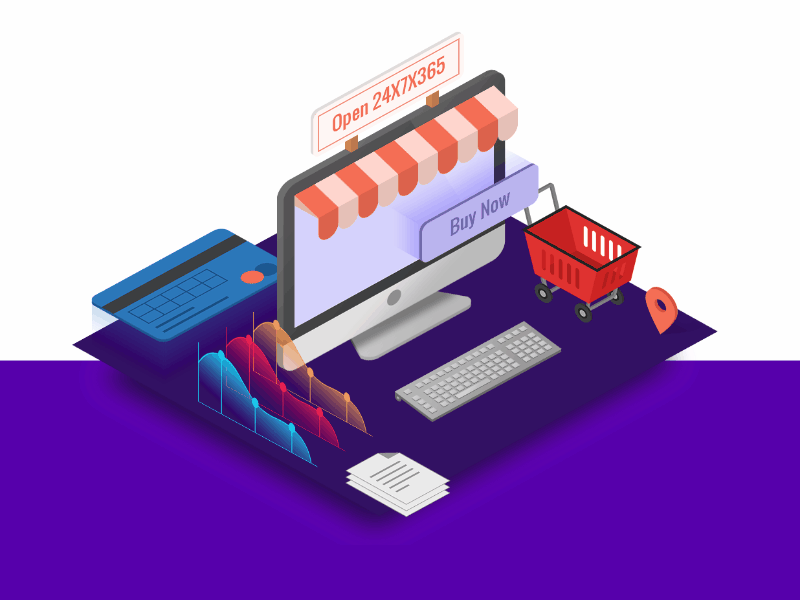

Cloud Technology to Boost E-Commerce Industry
The digital era has widened its wings even in the retail industry. The retailers have started using enterprise cloud computing solutions to improve their online visibility and sell more. Cloud technology is empowering in the e-commerce industry as it enables the business owners to pay-as-they-use. E-commerce industry analyst predicts that more than 80% of e-commerce storage and computing are likely to migrate to the cloud in the next ten years. Technological innovations in the cloud over the last few years make it possible to run an e-commerce platform out of a cloud. A cloud-based e-commerce platform is capable of handling scalability challenge and fuels global expansion.
Cloud computing makes it easier for e-commerce businesses by automating the manual process of ordering, merchandising, inventory and shipping. Customer order processing becomes a much simpler task with network-automated systems. This helps the e-commerce business to save time and maintain good quality. The new tide of cloud computing is likely to reshape the e-commerce industry towards buyers. The ultimate goal to integrate the technology with e-commerce is increasing revenue and boost customer service. It enables the e-commerce industry to rent the hardware and software rather than purchasing them. The cloud storage and computing are all set to accelerate the e-commerce revolution.
Let’s see how the e-commerce industry is leveraging cloud technology.
1. Savings on Overhead

The cloud technology makes the e-commerce business a cost-effective one by reducing the overhead expenses of having physical shops and showrooms. This is the most significant factor motivating retail industry to migrate to the cloud. The cloud technology uses virtualization thus eliminating the need to set up the in-house IT mechanisms.
The cloud system has eliminated not only capital investments but also reduced maintenance and storage costs. The technology is based on pay as you use model leading to a substantial reduction in operational cost. According to a report from 2019, the virtualized servers of cloud can help companies save up to 80% of expenditure.
2. Speed and Responsiveness

Speed is an essential factor for e-commerce businesses to keep the customers glued to them. The e-retailers look for instant business solutions. The cloud technology offers instant storing and data managing solutions without any need to wait for data centre construction. This infrastructure is capable of capturing valuable customer data, insights and other analytics.
A survey says 40% of customers are likely to abandon a web page if its loading time is more than 3 seconds. The cloud computing provides a higher bandwidth, computational power and storage keeping e-commerce sites always up and highly responsive. In the e-commerce world, it is indeed said the speedy your website is, the more money you make.
3. Intuitive and Virtual

Virtualization is at the heart of cloud computing. The technology makes it possible for the e-commerce industry to cater to the changing scenarios of the market. Virtualization enables upscaling and downscaling of the services depending on the demand and traffic. In addition, the scaling of IT requirements is cost-effective which does not require expensive IT changes. The scalable architecture of cloud paves a gateway for the e-commerce industry to grow as the business increases.
It is likely to boost the traffic and attract new customers leading to rising profit levels. The technology is capable of handling increased workloads thus helping the e-commerce retailers to meet the fluctuating demands in the peak season.
4. Customer Experience

In this era, the online experience is becoming more “consumer related”. The cloud technology is an opportunity for e-commerce industry to provide seamless experiences to the customers. The technology is capable of personalizing the service experience for a customer by remembering the user interaction history and continue interacting with the customers even after a device change. This may attract new customers and increase revenues of the e-commerce industry.
Cloud computing allows the retailers to solve customer queries by executing live chats thus delivering exuberant customer satisfaction.
Conclusion
The e-commerce industry has already begun migrating to the cloud system. The companies moving rapidly towards their cloud future will benefit the most. Pairing the e-commerce business with the powerful, flexible, efficient and scalable enterprise cloud is a winning solution. The online retailers have started embracing the cloud technology to serve better customer experience, grow their business and gain loyalty. Therefore, moving e-commerce to the cloud is the path to future agility, cost management, service differentiation and innovation.





